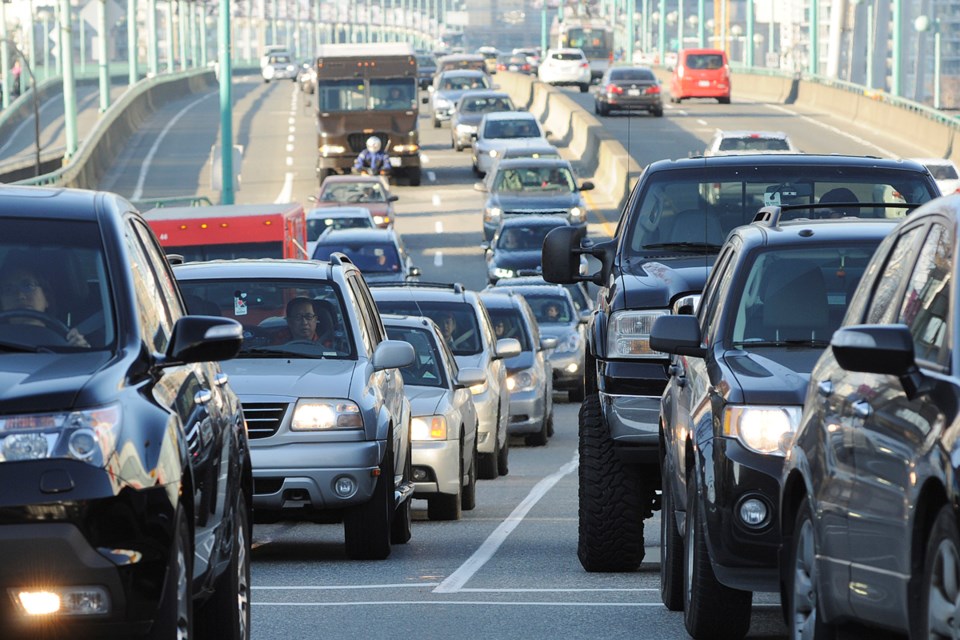When it comes to the future of transportation in Metro Vancouver, one can be forgiven for feeling a sense of gloom. As traffic gets worse and existing transit infrastructure struggles to meet growing demand, parochial politics seems to pervade every decision.
In recent weeks, the region has seen bridge tolls on the Port Mann and Golden Ears bridges removed and highway traffic surge. Ride-hailing services such as Uber have been put on indefinite hold, and the pause button was pushed on a replacement for the George Massey tunnel.
Additionally, a City of Â鶹´«Ă˝Ół»report now claims that the Georgia and Dunsmuir viaducts must come down due to seismic risks, in spite of there being no plausible plan to accommodate existing traffic flows without a huge public investment.
At the nexus of the region’s transportation dysfunction is the Mayors’ Council — a roundtable comprised of mayors from the tiny hamlets of Bowen Island, Anmore and Lion’s Bay, alongside the cities of Richmond, Surrey and Vancouver.
The Mayors’ Council has been promoting a “10-year plan” for regional transportation that still is not fully funded despite increased commitments by the federal and provincial governments. The council is calling for a share of B.C.’s carbon tax revenue to make up the gap.
The plan features a replacement of the Pattullo Bridge, an extension of the SkyTrain Millennium Line down the Broadway corridor in Â鶹´«Ă˝Ół»and a light rail (“LRT”) network in Surrey.
Of the three, the project that seems the most politically driven (thanks to the support of the Mayors’ Council) is Surrey’s $2.6-billion LRT plan to place at-grade rail down on existing roadways.
In response, a Surrey activist group opposed to the LRT plan — “SkyTrain for Surrey” — is championing another way to spend those billions. The group proposes a bus rapid transit (“BRT”) system for the city, while extending the SkyTrain route to Langley.
BRT is shown to successfully integrate into existing transit systems at a much lower cost.
When I reached out to experts who were familiar with the plan and the politics around the Surrey LRT project, not one of them could support it.
At the most recent meeting of the Mayors’ Council, Derek Corrigan was more publicly skeptical of the 10-year plan. Though the Burnaby mayor has been a thorn in the side of the provincial government and TransLink on several occasions, he speaks with authority on the economics of major developments.
Burnaby is growing faster than any municipality in Western Canada when it comes to condo tower construction, with about $1 billion in new development in 2017 alone.
During the meeting, Corrigan cautioned his fellow mayors on their plan for doing a bridge and two rapid transit extensions simultaneously — asserting it “flies in the face of Keynesian economics” to add major projects in an already superheated construction economy.
“That means that prices are going to go up significantly, because there is a limitation on the available resources here in British Columbia,” said Corrigan, adding the region already has two other major infrastructure developments pending — the proposed Kinder Morgan pipeline expansion, and the Lions Gate wastewater treatment plant. “Even if we look internationally, being able to do all those projects simultaneously is impossible.
“I don’t believe that this organization [TransLink] even for a moment could ramp up, and handle three projects that would probably tax the resources of the provincial government,” said Corrigan, adding there had not been any meaningful conversation at the Mayors’ Council on the implications of their proposal.
“What’s driving this is not good planning — it’s good politics. It’s the idea that Â鶹´«Ă˝Ół»can’t be ahead of Surrey, and Surrey can’t be ahead of Vancouver… All of these politics are driving us to expend far more of the public’s money than we should.
“I want to lay that out because I don’t want to, as a politician, not have raised those issues. You need to stop and think about what you’re undertaking, before you go down a path that’s going to leave a legacy for future politicians that’s unsustainable.”
The reaction from the Mayors’ Council? Their silence spoke volumes.
@MikeKlassen



